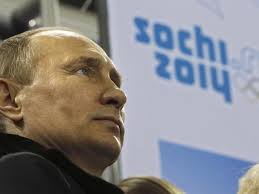By Mark Baber
August 14 – Russian President Vladimir Putin signed into law a bill July 29, unanimously passed by the State Duma, banning “propaganda of non-traditional sexual relations among minors.” Although homosexuality has been legal in Russia since 1993, the new law has attracted widespread criticism and campaigners, including Stephen Fry, have been attempting to organise a boycott of the Sochi Winter Olympics in 2014 to protest the new law, comparing it to Nazi persecution of the Jews.
The issue harks back to previous controversies over large sporting events, as well as providing a rehearsal of the debates inevitable over the World Cups in Russia 2018 and Qatar in 2022.
No one has yet been prosecuted under the new Russian Federal law, which was passed following the imposition of similar regulations at municipal level in St Petersburg and the banning of gay parades in Moscow. Neither “non-traditional relations” nor “propaganda” have been defined in law or tested in court but one of the authors of the law, Yelena Mizulina has listed four kinds of sexual activity that would be classified as “non-traditional.” They are: “men with men, women with women, bisexuality and being transgender.”
It is in the light of this uncertainty that the IOC has asked Russia for clarification over the implementation of the new law, with some (unconfirmed) reports indicating FIFA have done likewise.
Polls in Russia indicate an increase in the level of homophobia in society in recent years and the passing of the new law marks an acquiescence of the authorities in a campaign by conservative social forces, including the Orthodox Church, to conflate adult homosexuality and paedophilia, in order to generate a wave of social hatred on the back of already conservative sentiments.
England’s Stephen Fry, a high profile gay comedian with a Twitter following of over 6 million (and a board member of Premier League club Norwich City) has launched a campaign to boycott the Sochi Winter Olympics, comparing the event to Berlin in 1936 saying: “An absolute ban on the Russian Winter Olympics of 2014 in Sochi is simply essential. Stage them elsewhere in Utah, Lillehammer, anywhere you like. At all costs, Putin cannot be seen to have the approval of the civilised world.”
Even President Obama has weighted in saying: “I think they [President Vladimir Putin and Russia] understand that for most of the countries that participate in the Olympics, we wouldn’t tolerate gays and lesbians being treated differently.”
Russian sports minister, Vitaly Mutko, said the new law would apply to athletes in Sochi. “No one is forbidding an athlete with non-traditional sexual orientation from coming to Sochi, but if he goes on to the street and starts propagandising it, then of course he will be held accountable.”
Fry’s previous support for Olympic Games held in Beijng and London and invocation of the USA as being part of the “civilised world”, from whom the presumably uncivilised others should seek approval, indicate a rather one-sided view of the world, but his disgust at the homophobic laws in Russia is widely held and calls for boycotts have been effective in drawing attention to the issue – the question will become how far this could impact the 2018 World Cup, if at all.
LGBT athletes groups and gay commentators have come out against a boycott for a number of reasons, including in particular that participation itself can help to improve the lot of the Russian LGBT community. For instance the LGBT Sports Coalition has announced that “rather than talk about boycotts, the LGBT Sports Coalition is focused on participation. Whether or not an athlete is a member of the LGBT community, everyone who qualifies for these Games deserves the opportunity to compete safely. Out Olympians like New Zealand speed skater Blake Skjellerup cannot be beacons of hope for repressed LGBT Russians by forcing them to stay home during the Games.
“We did not choose Russia to host these Winter Games. However, we can use it as an opportunity to showcase the damage of repressive governments like that of President Putin.”
Other groups, arguing against a boycott, have emphasised the benefits of athletes wearing rainbow badges and other actions to protest the new law and emphasise the anti-discrimination message.
Comparisons have been drawn to Jesse Owen’s participation in 1936 and also the impact of Tommie Smith and John Carlos, gold and bronze medallists in the 200m in 1968, who, in a time when discrimination against black people in the US was at its worst, stood with their heads bowed and a black-gloved hand raised in a human rights salute as the American National Anthem played during the victory ceremony.
It should not be forgotten that Jesse Owens said that “Hitler didn’t snub me – it was FDR who snubbed me. The president didn’t even send me a telegram,” and Smith and Carlos were condemned by the International Olympic Committee for “a deliberate and violent breach of the fundamental principles of the Olympic spirit.”
The arguments over Sochi look set to be repeated in Qatar, where homosexuality is illegal, as it is in 80 other countries around the world. It remains to be seen if the sporting authorities, in bolstering the arguments of those opposing boycotts of their signature events, will see the wisdom of sticking to their avowed principles in combatting all forms of discrimination in sport, whilst providing support for those athletes and fans who wish to make public their personal allegiance to these same principles.
Contact the writer of this story at moc.l1734799850labto1734799850ofdlr1734799850owedi1734799850sni@r1734799850ebab.1734799850kram1734799850

